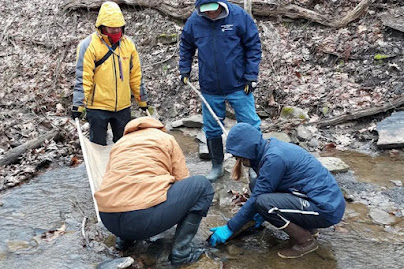These objects can help calculate the streamflow and provide useful data about the health of a stream.
Three Master Watershed Stewards from Allegheny County — Laurie Maglietta, Stephanie Rakowski, and Lauren Terpak — are team leaders for the stream assessment in the county’s nine regional parks.
"They've demonstrated remarkable professionalism, leadership, and dedication in their work on this extended project," said Mary Wilson, Master Watershed Steward coordinator in Allegheny County.
The task arose when members of the Allegheny County government contacted Wilson, looking for help with stream assessment in the county parks. Wilson saw the opportunity for Master Watershed Stewards to assist.
The project is a collaboration between the Master Watershed Steward program in Allegheny County and the Allegheny County Parks Foundation. A grant awarded to the foundation supported the purchase of equipment and supplies.
Grant funding was made possible through the Foundation for Pennsylvania Watersheds and is intended to support evaluating the park system’s water quality and developing a plan to mitigate concerns identified.
Wilson trained the volunteers to conduct three types of stream assessments: biological, chemical, and visual. Biological assessments involve identifying macroinvertebrates, the presence of which can indicate good stream health.
In chemical assessments, scientists sample water from the streams to test for parameters such as pH, dissolved oxygen, and turbidity. A visual assessment entails walking along the stream to evaluate various factors, including erosion, riparian buffers, tree canopy, and fish habitat.
The project kicked off last year with 16 volunteers. More volunteers are joining the effort as the project shifts to larger parks. The stewards will focus on three parks per year for three years.
The more people involved in the Master Watershed Steward program, the greater the potential environmental benefit, noted Terpak.
"You can make a much bigger impact within the watershed when more people are helping in all facets — whether it’s a stream assessment, litter and trash removal, or invasive species management," she said.
In this project, Terpak aims to match volunteers with tasks that interest them.
"If somebody is really interested in learning about macroinvertebrates, they could lead that particular effort," she said. "If somebody is really 'techie,' they could help oversee the tablet and data-entry portion."
The county developed software for volunteers to track the data they collect.
"One of our tasks is to make recommendations about what we think could happen to improve the water quality — possibly tree planting or removal of invasive species or some kind of streambank stabilization or remediation," said Maglietta. "In the future, if the park decided to do something like that, they could reach out to the Master Watershed Steward program for help."
Maglietta said the program has made her more confident about ways to help the environment.
"I think the biggest part of that stems from the fact that we now have enough knowledge to share what we know with other people and spread the word about how things work and what people can do to combat the problem," she said.
Rakowski appreciates the continuous opportunities for learning.
"A Master Watershed Steward is supposed to help educate the community — well, it works flipside," she said. "I walk away having learned something new every day from the people I'm with."
Maglietta, Terpak, and Rakowski all remarked on the energizing nature of the Master Watershed Steward community.
"In this program, you’re working with people who want to be there and are eager to help," Maglietta said. "Every time I go out, even though we come home covered with burs and mud, I feel so good about being with these people because it's such a positive bunch."
The Penn State Master Watershed Steward program provides extensive training in watershed management to volunteers who, in return, educate the community about watershed stewardship based on university research and recommendations.
The program was established to strengthen local capacity for management and protection of watersheds, streams, and rivers by educating and empowering volunteers across the Commonwealth.
Anyone interested in becoming a Master Watershed Steward can learn more about the program on the Penn State Extension website.
(Reprinted from the Penn State Extension Watershed Winds newsletter. Click Here to sign up for your own copy (bottom of the page).)
Upcoming Extension Events:
-- October 26: Webinar: Growing Water Wise - Stormwater Challenges
-- October 27: Webinar: Master Watershed Steward Information Session For PA Wilds
-- November 1: Safe Drinking Water Clinic Youngsville, Warren County
-- January 11: Webinars (9 Part Series): Woods In Your Backyard Series
Related Articles - Extension
-- Celebrating 10 Years Of Volunteer Impact - Greening The Lower Susquehanna - By Kristen Koch, Penn State Agriculture & Environment Center
-- PA Passes Rule Setting Drinking Water Limits For PFOA/PFOS
-- Green Parking Lots: Mitigating Climate Change And The Urban Heat Island
-- Beech Leaf Disease In Pennsylvania
NewsClips:
-- PA Council Of Trout Unlimited: Adams County TU Chapter Awarded South Mountain Partnership Grant
-- PennLive Guest Essay: Five Million Trees Planted, Five Million More To Go - Cindy Adams Dunn, Secretary Of DCNR
Related Articles:
-- City & State PA Recognize The 2022 Pennsylvania Nonprofit Power 100 Leaders, Including 7 Conservation Leaders [PaEN]
-- Keystone 10 Million Trees Partnership Plants Its 5-Millionth Tree In Franklin County Park; Thousands Of Volunteers Were Critical To Reaching This Milestone [PaEN]
-- U.S. Fish & Wildlife Service, National Fish & Wildlife Foundation Award $3.5 Million In Grants To Restore, Protect Habitats In Chesapeake Bay Watershed; 4 In PA Totalling $1.48 Million [PaEN]
-- WeConservePA Visits Award-Winning Headwaters Restoration Project By Wissahickon Trails In Montgomery County [PaEN]
-- NO SPECIAL PROTECTION: The Exceptional Value Loyalsock Creek In Lycoming County Is Dammed And Damned - Video Dispatch From The Loyalsock - By Barb Jarmoska, Keep It Wild PA
-- Susquehanna River Basin Commission Has No Exclusion Zones For Water Withdrawals From Any Streams, Including EV Or HQ Streams Subject To Water Quality Antidegradation Rules [PaEN]
[Posted: October 20, 2022] PA Environment Digest


No comments :
Post a Comment